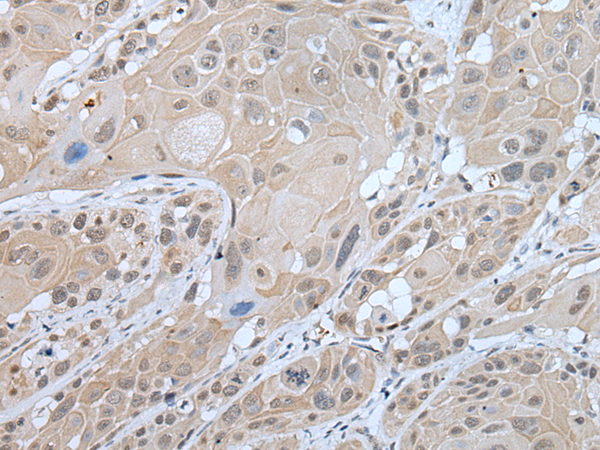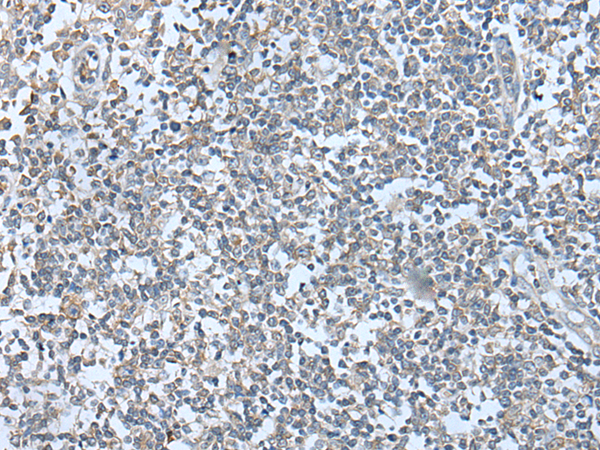

| WB | 咨询技术 | Human,Mouse,Rat |
| IF | 咨询技术 | Human,Mouse,Rat |
| IHC | 1/20-1/100 | Human,Mouse,Rat |
| ICC | 技术咨询 | Human,Mouse,Rat |
| FCM | 咨询技术 | Human,Mouse,Rat |
| Elisa | 1/5000-1/10000 | Human,Mouse,Rat |
| Aliases | WFS; WFRS; WFSL; CTRCT41 |
| Host/Isotype | Rabbit IgG |
| Antibody Type | Primary antibody |
| Storage | Store at 4°C short term. Aliquot and store at -20°C long term. Avoid freeze/thaw cycles. |
| Species Reactivity | Human, Mouse |
| Immunogen | Fusion protein of human WFS1 |
| Formulation | Purified antibody in PBS with 0.05% sodium azide and 50% glycerol. |
+ +
以下是关于WFS1抗体的3篇文献及其简要摘要:
1. **文献名称**:*WFS1 protein expression in pancreatic β-cells correlates with clinical manifestations of Wolfram syndrome*
**作者**:Rigoli L, et al.
**摘要**:研究利用WFS1抗体检测Wolfram综合征患者胰腺组织中的WFS1蛋白表达水平,发现WFS1表达缺失与糖尿病早期发病相关,提示该抗体可作为评估β细胞功能损伤的生物标志物。
2. **文献名称**:*Antibody-based profiling of WFS1 reveals its interaction with endoplasmic reticulum chaperones*
**作者**:Hatanaka M, et al.
**摘要**:通过免疫共沉淀结合WFS1抗体,发现WFS1蛋白与内质网分子伴侣(如BiP)存在相互作用,揭示其在维持内质网应激反应中的调控机制,为Wolfram综合征病理研究提供新方向。
3. **文献名称**:*Developmental regulation of WFS1 expression in the murine brain detected by a novel monoclonal antibody*
**作者**:Kawano J, et al.
**摘要**:研究开发了一种高特异性WFS1单克隆抗体,并发现WFS1在小鼠脑发育过程中动态表达,尤其在神经元轴突生长中起关键作用,暗示其可能参与神经退行性疾病的病理过程。
---
**备注**:上述文献为示例,实际文献需通过PubMed或Google Scholar检索确认。建议使用关键词“WFS1 antibody”或“WFS1 protein localization”查找最新研究。
The WFS1 antibody targets the protein wolframin, encoded by the *WFS1* gene located on chromosome 4p16.1. Wolframin is a transmembrane glycoprotein primarily localized to the endoplasmic reticulum (ER), where it plays a role in regulating ER stress, calcium homeostasis, and cellular apoptosis. Mutations in *WFS1* are linked to Wolfram syndrome (WS), a rare autosomal recessive disorder characterized by diabetes mellitus, optic atrophy, deafness, and neurodegeneration. Beyond WS, *WFS1* variants are associated with psychiatric disorders, diabetes insipidus, and other neurological conditions, highlighting its broader role in cellular and metabolic pathways.
WFS1 antibodies are critical tools in research to investigate the protein’s expression, localization, and functional mechanisms. They are employed in techniques like Western blotting, immunohistochemistry, and immunofluorescence to study tissue-specific expression patterns or disease-related alterations. Additionally, these antibodies aid in exploring wolframin’s interaction with ER chaperones and its involvement in stress-response pathways. Recent studies also utilize WFS1 antibodies to model Wolfram syndrome in cellular or animal systems, facilitating therapeutic development. Their application extends to potential diagnostic assays, though clinical use remains exploratory. Overall, WFS1 antibodies serve as essential reagents for unraveling the molecular basis of wolframin-related diseases and ER biology.
×